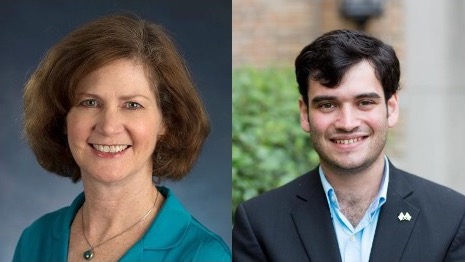About this Episode:
Show Notes:
Welcome to Global Stage, a podcast highlighting academic and policy-oriented international research on democracy and human development! Global Stage is brought to you by the Kellogg Institute for International Studies, part of the Keough School of Global Affairs at the University of Notre Dame. Your guest host is Jacob Turner, a PhD student in political science at Notre Dame and doctoral affiliate of the Kellogg Institute.
In today’s episode, our featured guest is Jennifer McCoy, professor of political science at Georgia State University and non-resident scholar at the Carnegie Endowment for International Peace. She was previously Director of the Carter Center’s Americas Program from 1998-2015, leading projects on democratic strengthening, mediation and dialogue and hemispheric cooperation. She most recently edited The ANNALS of AAPSS’s special issue titled Polarizing Polities: A Global Threat to Democracy alongside Murat Somar.
To begin, Jennifer gives an overview of her time at the Carter Center. When the former president started the Center, they wanted to create a place for the peaceful resolution of conflicts and mediation and strengthening democracy. Her work as director included election monitoring for countries without confidence in their elections, mediating conflicts between countries including Ecuador and Colombia, and becoming involved in the Colombian Peace Process. Another important project of hers was organizing two trips for President Carter to visit Cuba. He was the first former or sitting president of the United States to visit Cuba after the Revolution.
Then, Jennifer shares that she has studied Venezuela for more than three decades. She has found that people’s political opinions extend into society and a divide affects personal relationships. When we stop interacting with people whose political opinions differ from our own, we become more susceptible to believing the stereotypes and biases we have heard about them. Once a leader capitalizes on a grievance and makes people wary of particular groups, those divides are even more strengthened. The next phase of the project, Jennifer shares, encourages finding solutions for depolarization. In closing, she shares a few additional bright spots she witnessed of leaders working to heal these divides.
Links:
Learn more about Dr. Jennifer McCoy.
Learn more about Polarizing Polaties: A Global Threat to Democracy
Read “Why do Democracies Develop and Decline?” Democracy and Autocracy Vol. 21(1): June 2023. APSA Democracy and Autocracy Section.
Learn more about the Kellogg Institution for International Studies
Listen
Listen below, ask your smart device to “play Global Stage Podcast,” or find us on:
Apple | Spotify | Google Podcasts | Stitcher | iHeartRadio | TuneIn






